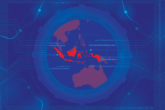January 28, 2020
Great Powers Must Talk to Each Other About AI
Imagine an underwater drone armed with nuclear warheads and capable of operating autonomously. Now imagine that drone has lost its way and wandered into another state’s territorial waters.
A recipe for disaster? Perhaps. But science fiction? Sadly, no.
Russia aims to field just such a drone by 2027, CNBC reported last year, citing those familiar with a U.S. intelligence assessment. Known as Poseidon, the drone will be nuclear-armed and nuclear-powered.
While the dynamics of artificial intelligence and machine learning, or ML, research remain open and often collaborative, the military potential of AI has intensified competition among great powers. In particular, Chinese, Russian and American leaders hail AI as a strategic technology critical to future national competitiveness.
Read the full article in Defense One.
More from CNAS
-
The American AI Century: A Blueprint for Action
Foreword By Robert O. Work We find ourselves in the midst of a technological tsunami that is inexorably reshaping all aspects of our lives. Whether it be in agriculture, finan...
By Martijn Rasser, Megan Lamberth, Ainikki Riikonen, Chelsea Guo, Michael Horowitz & Paul Scharre
-
Siliconsciousness: The AI Competition: Public Policy Strategies: Part 1
This episode comprises the first part of our special event, “The AI Competition: Public Policy Strategies”. The event, co-hosted by MIT Technology Review, brings together some...
By Dr. ED McGrady
-
How Drones in Ukraine Are Reshaping War
Samuel Bendett, a senior adjunct fellow at the Center for a New American Security, joins The Cipher Brief to discuss the current situation of drones being used in Ukraine.Watc...
By Samuel Bendett
-
Countering the Digital Silk Road: Indonesia
This year marks the 10th anniversary of the Digital Silk Road (DSR), China’s ambitious initiative to shape critical digital infrastructure around the world to advance its geop...
By Vivek Chilukuri & Ruby Scanlon



